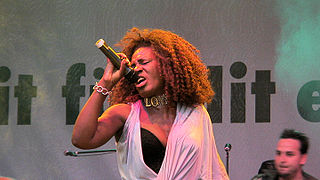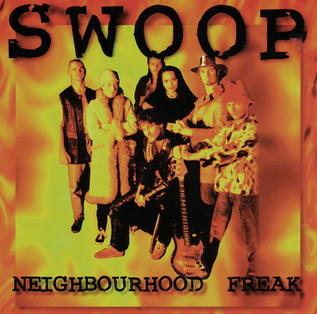Related Research Articles
Def FX was an Australian band created by Sean Lowry (keyboards) in 1990 and included Fiona Horne on lead vocals, Blake Gardiner on guitar and Martyn Basha on bass - the band had no drummer. They released four albums, Light Speed Collision, Baptism, Ritual Eternal, Majick before disbanding in April 1997. For United States releases and touring they used Definition FX as their band name to avoid confusion with similarly named groups.

Culture Beat is a German Eurodance project formed in 1989 by Torsten Fenslau. The act has gone through a number of lineup changes over the years; they achieved the most success whilst fronted by singer Tania Evans and rapper Jay Supreme. Their 1993 single "Mr. Vain" was a number-one hit in eleven European countries, and the act claims to have sold more than 10 million records worldwide.

Technotronic was a Belgian electronic music project formed in 1987 by Jo Bogaert, best known for the 1989 single "Pump Up the Jam", which features vocals by Ya Kid K. The song peaked at number 2 on the Billboard Hot 100 in the United States. Later that year, the single was followed by Pump Up the Jam: The Album, which peaked at number 10 on the Billboard 200. They achieved further success with the singles "Get Up! " and "Move This". Technotronic went on to release the albums Body to Body (1991) and Recall (1995).

Don't Ask is the third studio album by Australian singer Tina Arena released by Columbia Records on 14 November 1994.
The Grid are an English electronic dance group, consisting of David Ball and Richard Norris, with guest contributions from other musicians. They are best known for the hits "Swamp Thing", "Texas Cowboys", "Crystal Clear", "Rollercoaster" and "Floatation".
Boxcar were an Australian electronic dance pop group formed in Brisbane in 1986. Their founding mainstay was David Smith on vocals, guitar and keyboards. Three of their singles appeared on the Billboard dance chart top 20, "Freemason ", "Insect" and "Gas Stop ". They released two albums on Volition Records/Sony Music Australia, Vertigo (1990) and Algorhythm (1994), before disbanding in 1997. They briefly reformed in 2010 and in 2014.
I'm Talking are an Australian funk-pop rock band, which featured vocalists Kate Ceberano and Zan Abeyratne. They formed in 1983 in Melbourne and provided top ten hit singles "Trust Me", "Do You Wanna Be?" and "Holy Word" and a top fifteen album, Bear Witness, before disbanding in 1987. The group reunited in October 2018, and went on a 2019 tour as well as a series of small venue shows.
Supergroove is a New Zealand funk rock music group. Their debut album Traction was released in 1994. The group disbanded in 1997 but reformed in 2007.
Baby D is an English breakbeat hardcore and house music group, best known for their hit single "Let Me Be Your Fantasy" which hit number 1 on the UK chart in 1994.
GANGgajang are an Australian pop rock band which formed in 1984.
Directions in Groove or DIG were an Australian acid jazz band which formed in 1991 by Alexander Hewetson on bass guitar, Terepai Richmond on drums and percussion, Rick Robertson on saxophone, Tim Rollinson on guitar and Scott Saunders on keyboards. Originally styled as dig they performed instrumental acid jazz before Saunders added vocals. They released three studio albums, Dig Deeper, Speakeasy and Curvystrasse. At the APRA Music Awards of 1996 they won Most Performed Jazz Work for their track, "Futures". They disbanded in 1998 before reforming in 2008 for selected performances and again 2011 to release a fourth studio album, Clearlight.
Christian John Brien is a drummer, percussionist and drum clinician. From 1992 he was a member of the Australian rock, funk and disco band Swoop and appears on all three of their studio albums, Thriller, Woxo Principle, and Be What You Is.
The Truth were an Australian funk band, active from 1991 to 1997. The lineup included Nicky Bomba on drums, his older brother Michael Caruana on keyboards, Mick Girasole on bass guitar, Tony Kopa on vocals and Geoff Wells on guitars. They released two albums, The Truth (1994), which peaked in the top 60 on the ARIA Albums Chart, and Headspace (1997).
Skunkhour are an Australian funk rock band that were formed in Sydney in 1991. They released four studio albums, Skunkhour, Feed, Chin Chin and The Go before disbanding in November 2001. Feed peaked at No. 21 on the ARIA Albums Chart while Chin Chin reached No. 34. Four of the group's songs, "Up to Our Necks in It" (1995), "Weightlessness" (1997), "Home" (1999), and "Kick in the Door" (2000) were listed in the annual Triple J Hottest 100. The group has reformed periodically since 2009 for occasional concerts and festival appearances.
CDB are an Australian R&B, dance and vocal harmony quartet formed in 1991 with Andrew De Silva, Brad Pinto and his brother Gary Pinto, as well as Danny Williams. CDB is an initialism which stands for Central Dandenong Boys. Their highest charting single was a cover version of Earth, Wind & Fire's "Let's Groove", which peaked at number two on the ARIA Singles Chart and number one on the New Zealand Singles Chart. "Hey Girl " also reached number one in New Zealand. Their debut studio album, Glide with Me was released in November 1995. The group disbanded in 1999.
The Badloves are an Australian R&B, soul band that formed as DC3 in 1990 by founding mainstay member Michael Spiby on guitar and lead vocals. They changed their name after a year. Their debut studio album, Get on Board, was issued in July 1993, which peaked at No. 5 on the ARIA Albums Chart. At the ARIA Music Awards of 1994 they won Best New Talent and Breakthrough Artist – Album for Get on Board and Breakthrough Artist – Single for its first single, "Lost" (1993). The Badloves' second album, Holy Roadside, reached the top 20. Their highest-charting single, "The Weight" (1993), is a cover version of the Band's 1968 single and features Jimmy Barnes on co-lead vocals. It reached the ARIA singles chart top 10.

"Apple Eyes" is a song by Australian band Swoop that was released in October 1995 as the third single from the group's second studio album, The Woxo Principle (1995). It was their most successful single, peaking at number nine on the Australian ARIA Singles Chart. The single was certified gold by Australian Recording Industry Association (ARIA) for shipments exceeding 35,000 copies. At the ARIA Music Awards of 1996, the song was nominated for Song of the Year and Best Video.

Get on Board is the debut studio album by Australian band The Badloves. released in July 1993. The album peaked at number 3 on the ARIA Albums chart and was certified double platinum by ARIA. It was re-released in 1994 with a bonus 8-track disc.

"Neighbourhood Freak" is a song by Australian band Swoop and was released in October 1994 as the first single from the group's second studio album The Woxo Principle. It was their first charting single, peaking at number 62 on the ARIA Charts.

The Woxo Principle is the second studio album by Australian funk band Swoop. The album was released in November 1995 and peaked at number 51 on the ARIA Charts.
References
- 1 2 3 4 5 6 7 8 9 10 11 12 13 McFarlane, Ian (1999). "Encyclopedia entry for 'Swoop'". Encyclopedia of Australian Rock and Pop . St Leonards, NSW: Allen & Unwin. ISBN 1-86508-072-1. Archived from the original on 28 August 2004. Retrieved 16 February 2023. Note: McFarlane incorrectly has Chris Brien as Chris O'Brien.
- 1 2 3 4 "Swoop – Seven-Piece Funk Machine". The Newcastle Post. TE Liftout. Alan Oakley. 8 July 1998. Retrieved 21 March 2013.
- 1 2 3 4 5 Lang, Rebecca (19 November 1992). "Slaughtermen Reincarnated. Swooping on Funk". The Canberra Times . Vol. 67, no. 21039. p. 21. Retrieved 15 February 2023– via National Library of Australia.
- 1 2 3 Mitchell, Sean (2 December 2007). "Chris Brien". The Black Page. Sean Mitchell. Retrieved 20 March 2013.
- ↑ McFarlane, Ian (2017). "Encyclopedia entry for 'Directions in Groove (dig)'". The Encyclopedia of Australian Rock and Pop. Jenkins, Jeff (Foreword) (2nd ed.). Gisborne, Vic: Third Stone Press. p. 136. ISBN 978-0-9953856-0-3.
- 1 2 3 "Search | Hottest 100 Archive". Triple J (Australian Broadcasting Corporation (ABC)). 11 November 2017. Retrieved 17 February 2023.
- 1 2 Mintern, Glenn (27 September 1996). "The Mintern Tapes". Victor Harbor Times . Vol. 92, no. 3. Victor Harbor, SA. p. 16. Retrieved 17 February 2023– via National Library of Australia.
- 1 2 3 4 5 6 Australian chart peaks:
- Top 50 peaks: "australian-charts.com > Discography Swoop". Hung Medien. Retrieved 3 March 2016.
- Top 100 peaks: Ryan, Gavin (2011). Australia's Music Charts 1988–2010 (PDF ed.). Mt Martha, Victoria, Australia: Moonlight Publishing. p. 273.
- The Raw Funk Power EP: "The ARIA Australian Top 100 Singles Chart – Week Ending 08 May 1994". ARIA . Retrieved 4 March 2016– via Imgur.com. N.B. The HP column displays the highest peak reached.
- "Neighbourhood Freak": "The ARIA Australian Top 100 Singles Chart – Week Ending 18 Dec 1994". ARIA. Retrieved 8 September 2016– via Imgur.com.
- "Rock Dog": "The ARIA Australian Top 100 Singles Chart – Week Ending 10 Sep 1995". ARIA. Retrieved 4 July 2017– via Imgur.com.
- "(It Could Happen) Any Day Now": "The ARIA Australian Top 100 Singles Chart – Week Ending 12 May 1996". ARIA. Retrieved 11 August 2017– via Imgur.com.
- ↑ "ARIA Awards – History: Winners by Year 1994: 8th Annual ARIA Awards". Australian Recording Industry Association (ARIA). Retrieved 20 March 2013.
- ↑ O'Grady, Anthony. "The 8th Annual ARIA Music Awards". Australian Recording Industry Association. Archived from the original on 29 June 2001. Retrieved 17 February 2023.
- 1 2 "The ARIA Australian Top 100 Singles 1996". ARIA. Archived from the original on 2 November 2015. Retrieved 3 March 2016– via Imgur.com.
- ↑ Armitage, Liz (4 December 1995). "Home Entertainment: So Indulgent but the Spirit's Infectious". The Canberra Times. Vol. 71, no. 22, 145. p. 34. Retrieved 17 February 2023– via National Library of Australia.
- ↑ Woodridge, Simon (October 1995). "Swoop Written". Juice Magazine (32). Archived from the original on 3 August 1997. Retrieved 17 February 2023.
- ↑ "ARIA Awards – History: Winners by Year 1996: 10th Annual ARIA Awards". Australian Recording Industry Association (ARIA). Retrieved 20 March 2013.
- ↑ "Winners by Year – 26th ARIA Awards 2012 – Search Results 'Swoop'". Australian Record Industry Association . Retrieved 20 March 2013.
- 1 2 "Releases :: Chapter 1". Australian Music Online . Archived from the original on 19 April 2006. Retrieved 17 February 2023– via National Library of Australia.
- ↑ Swoop (Musical group) (1998), Be What You Is, Mushroom Records, retrieved 17 February 2023
- 1 2 Professor Groove and the Booty Affair. "And so Funketh the Wise Man". Australian Music Online. Archived from the original on 21 September 2007. Retrieved 21 March 2013.
- ↑ "Professor Groove & the Booty Affair". Australian Jazz Agency. Retrieved 21 March 2013.
- ↑ Professor Groove and the Booty Affair (Musical group) (2001), And so Funketh the Wise Man, Vitamin Records. National Library of Australia, retrieved 21 March 2013
- ↑ "Rebekah LaVauney". girl.com.au. Archived from the original on 4 May 2010. Retrieved 18 February 2023– via National Library of Australia.
- ↑ Swoop (Musical group) (1993), Thriller, Freakzone, retrieved 17 February 2023
- ↑ "Winners by Year 1994". Australian Recording Industry Association (ARIA). Archived from the original on 9 January 2012.
- ↑ "Winners by Year 1996". Australian Recording Industry Association (ARIA). Archived from the original on 14 December 2007. Retrieved 3 December 2013.